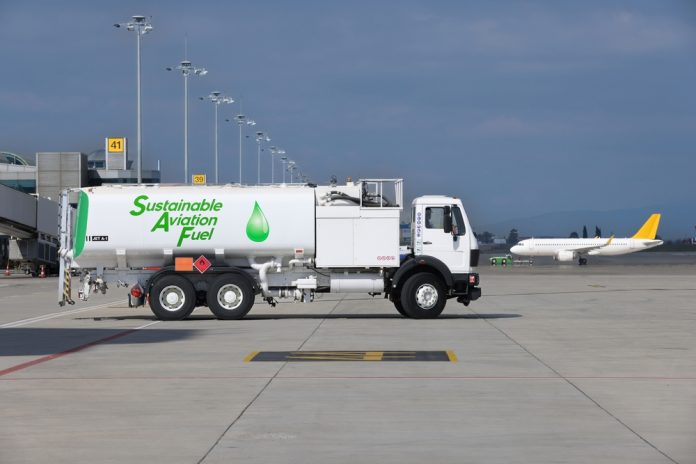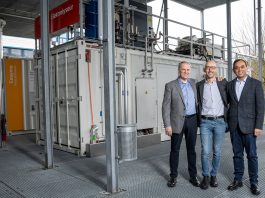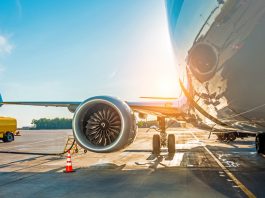Passengers will enjoy greener plane journeys thanks to new support for the sustainable aviation fuel (SAF) industry.
Sustainable fuel production will help tackle emissions, establish Britain as a clean energy superpower, and allow the UK to go further and faster with expansion plans.
The UK Government has published a consultation setting out how it intends to support the green fuels sector and provide certainty for SAF producers, which is the latest step in the government’s plan to support the aviation sector to kickstart economic growth.
The role of SAF in a green climate
The SAF industry is crucial for the future of aviation, offering a sustainable alternative to traditional jet fuels.
By reducing greenhouse gas emissions by up to 70% compared to fossil fuels, sustainable aviation fuel will play a vital role in delivering our clean energy mission and allow the UK to back airport expansion in line with climate commitments.
Backing investment in the low-carbon sector also has huge potential for driving economic growth, as it’s expected to support up to 15,000 new jobs and deliver £5 billion to the UK economy by 2050.
As this is still a new and emerging industry, today’s proposals will tackle the current uncertainty in the sector by introducing an industry-funded price guarantee – known as the revenue certainty mechanism (RCM) – to ensure a steady income flow for producers, even if the price of SAF fluctuates, helping to keep down costs for airlines and holidaymakers.
The UK’s position in decarbonised air travel
The proposals will help to reduce risk, give investors the confidence they need to invest in UK SAF plants and help the sector secure the supply it needs to bolster the SAF industry in the UK.
The mechanism is also designed to limit costs and protect holidaymakers and working people against significant cost increases, with any rises expected to be in line with the usual variation of ticket prices.
The revenue certainty comes alongside the introduction of the SAF Mandate in January 2025, which requires a growing percentage of aviation fuel to come from sustainable sources to support the industry by securing demand and driving production in the UK.
The mandate was one of the first in the world to be put into law, once again putting the UK at the forefront of decarbonising air travel.
The revenue certainty mechanism combined with the mandate will contribute to the nation’s net zero goals, enabling the aviation sector to continue to grow, including through airport expansion.
This is also expected to drive significant investment into the SAF sector, creating green jobs, fostering innovation and driving growth as part of the government’s Plan for Change.
Aviation Minister Mike Kane said: “We are committed to building the technology and fuel supply that will see greener flying become a reality in a way that protects consumers.
“As part of our Plan for Change, these proposals will power up sustainable aviation fuel production in the UK, support thousands of green jobs, and bolster expansion plans.”
The consultation will run from 3-31 March, with the Sustainable Aviation Fuel (Revenue Support Mechanism) Bill being laid in Parliament in the spring.
Other sustainable aviation fuel initiatives
This new support for SAF will build on the £63m recently announced by the Chancellor in her growth speech to boost the production of alternative fuels in the UK.
Furthermore, in September last year, the department announced a refreshed and rejuvenated Jet Zero taskforce, which is serving as the driving force to transform how people fly. This aligns with the government’s mission to make the UK a clean energy superpower and kickstart the economy.
In a further boost for sustainable aviation, the UK led the charge for new carbon limits on aircraft at the International Civil Aviation Organization (ICAO), which will see all new aircraft types become 10% more efficient from 2031.
This will help cut emissions and fuel costs, benefitting passengers as well as the planet. Regulations on aircraft noise will also be strengthened from 2029 to make planes quieter when taking off and landing.
Karen Dee, Chief Executive of AirportsUK, concluded: “SAF will play a key role in decarbonising aviation, and a revenue certainty mechanism will not only ensure the UK can access enough supply but also that we can benefit from thousands of jobs and billions in investment.
“These investments will allow the UK’s global air connectivity to expand sustainably within our net zero targets and play an increasing role in growing our economy, something the government is prioritising to drive up the prosperity of the whole country.”









